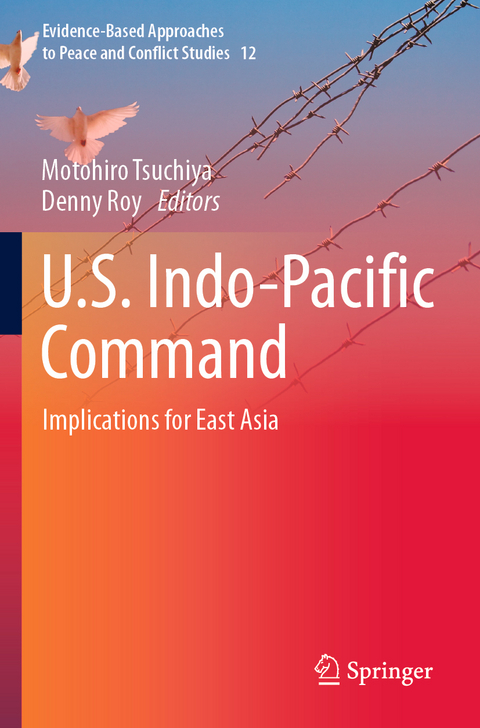
U.S. Indo-Pacific Command
Springer Verlag, Singapore
978-981-19-5270-8 (ISBN)
The mission of INDOPACOM is to protect U.S. territory, people, and national interests. However, it also includes protection of the countries within its geographic scope that are U.S. allies and security partners. INDOPACOM and its precursor Pacific Command, established in 1947, have always been major contributors to the peace and safety of Japan in the post-World War II era.
In view of the importance of U.S. interests in Northeast Asia, the region also has two Sub-Unified Combatant Commands called United States ForcesJapan (USFJ) and United States Forces Korea (USFK). Each of these organizations strives to strengthen the relationship with the Japan Self-Defense Forces and the Republic of Korea armed forces. Together, the United States, Japan and our partners around the globe will continue to safeguard the rules-based security order that has underpinned peace and prosperity for decades.
Dr. Motohiro TSUCHIYA is Vice-President for Global Engagement and Information Technology at Keio University, and Professor at Keio University Graduate School of Media and Governance.Prior to joining the Keio faculty, he was associate professor at Center for Global Communications (GLOCOM), International University of Japan. In 2001 and 2002 he researched in Washington, DC, as visiting scholar at Center for International Development and Conflict Management (CIDCM), University of Maryland, and at Cyberspace Policy Institute (CPI), George Washington University. From March 2008 to March 2009 he was visiting scholar at MIT (Massachusetts Institute of Technology) Center for International Studies. He served as deputy director of Keio University Global Security Research Institute (G-SEC) from 2009 to 2013, and was an expert member of the Information Security Policy Council (ISPC) of the Japanese government from 2009 to 2013. From March 2014 to February 2015 he was visiting scholar at East-West Center. He served as dean of Faculty of Policy Management at Keio University from October 2019 to July 2021. He is interested in the impact of the information revolution on international relations; global governance and information technologies; and cyber security. He has been a member of the Editorial Advisory Board of Info Journal since spring of 2008 and a member of the Editorial Board of Journal of Cyber Policy since 2015. He is also a visiting research fellow at Center for Global Communications (GLOCOM) and a visiting researcher at Institute for International Socio-Economic Studies (I-ISE). He authored Information and Global Governance (Tokyo: Keio University Press, 2001, in Japanese), Net Politics (Tokyo: Iwanami Publishing, 2003, in Japanese), Network Power (Tokyo: NTT Publishing, 2007, in Japanese), Intelligence and National Security (Tokyo: Keio University Press, 2007, in Japanese), Network Hegemony (Tokyo: NTT Publishing, 2011, in Japanese), Cyber Terror (Tokyo: Bungeishunju, 2012, in Japanese), Cyber Security and International Relations (Tokyo: Chikura Shobo, 2015, in Japanese), and co-authored more than 20 books including Japanese Telecommunications: Market and Policy in Transition (London: Routledge, 2006, in English), Cybersecurity: Public Sector Threats and Responses (Boca Raton, FL: CRC Press, 2012, in English), The Digital Divide: The Internet and Social Inequality in International Perspective (London: Routledge, 2013, in English), Pacific Island Regional and International Cooperation: ICT Policy and Development (Honolulu: Social Science Research Institute, University of Hawaii, 2014, in English), and Information Governance in Japan: Towardsa New Comparative Paradigm (SVNJ eBook series, Kindle Edition, 2016).He earned his BA in political science, MA in international relations, and Ph.D. in media and governance from Keio University. Dr. Denny ROY’s work has focused mostly on Asia Pacific security issues, particularly those involving China. Recently Roy has written on Chinese foreign policy, the North Korea nuclear weapons crisis, China-Japan relations, and China-Taiwan relations. Before joining the East-West Center in 2007, Roy worked at the Asia-Pacific Center for Security Studies in Honolulu; the Naval Postgraduate School in Monterey, California; the Strategic and Defence Studies Centre at the Australian National University in Canberra; the National University of Singapore; and Brigham Young University. Roy’s most recent book is Return of the Dragon: Rising China and Regional Security (Columbia University Press, 2013). He has also written many articles for scholarly journals such as International Security, Survival, Asian Survey, Security Dialogue, Contemporary Southeast Asia, Armed Forces & Society, and Issues & Studies. Dr. Roy obtained a Ph.D. in Political Science from the University of Chicago.
Organization and History of the Unified Commands of the United States.- America’s Deep Rationale for PACOM.- Hawaii and Pacific Command: Historical Backdrop and Civil Society of Hawaii, Home of Pacific Command Headquarters.- PACOM and the Pentagon.- The Japan Self-Defense Forces and the U.S. Pacific Command.- The Korean Peninsula and the Pacific Command.- China and Pacific Command: The Course of Hegemony in the Indo-Pacific Region.- Taiwan and Pacific Command.- Joint Operations and Pacific Command: Development and Implementation of the Multi Domain Battle Concept.
| Erscheinungsdatum | 02.11.2023 |
|---|---|
| Reihe/Serie | Evidence-Based Approaches to Peace and Conflict Studies |
| Zusatzinfo | 2 Illustrations, color; 3 Illustrations, black and white; XIV, 177 p. 5 illus., 2 illus. in color. |
| Verlagsort | Singapore |
| Sprache | englisch |
| Maße | 155 x 235 mm |
| Themenwelt | Sozialwissenschaften ► Politik / Verwaltung ► Europäische / Internationale Politik |
| Sozialwissenschaften ► Politik / Verwaltung ► Vergleichende Politikwissenschaften | |
| Wirtschaft ► Volkswirtschaftslehre ► Wirtschaftspolitik | |
| Schlagworte | INDOPACOM • Japan Self-Defense Forces • Japan-U.S. Cooperation • Republic of Korea Armed Forces • United States Forces Japan (USFJ) • United States Forces Korea (USFK) • U.S. Indo-Pacific Command • USINDOPACOM |
| ISBN-10 | 981-19-5270-1 / 9811952701 |
| ISBN-13 | 978-981-19-5270-8 / 9789811952708 |
| Zustand | Neuware |
| Informationen gemäß Produktsicherheitsverordnung (GPSR) | |
| Haben Sie eine Frage zum Produkt? |
aus dem Bereich


